After a two-week cleanup effort, the makeshift two-storey house is gone. So are the chaotic plywood structures covered in tarps. Gone too are the small gardens planted in cinder blocks and the piles and piles of junk.
The sweep of Vancouver’s CRAB Park, Canada’s only legal tent city, is the latest step in the city’s eight-year struggle to deal with a series of camps.
Some CRAB Park residents said the cleanup was necessary.
“The camp needed to be cleaned up,” Clint Randan told The Tyee. “I don’t make any friends when I say this, but that mess drove me nuts — it’s a public park.”
But others say they won’t be moving back to the city’s new camp location, a gravel-covered area that is much smaller than the previous tent city, dotted with 27 identical blue tents purchased by the city.
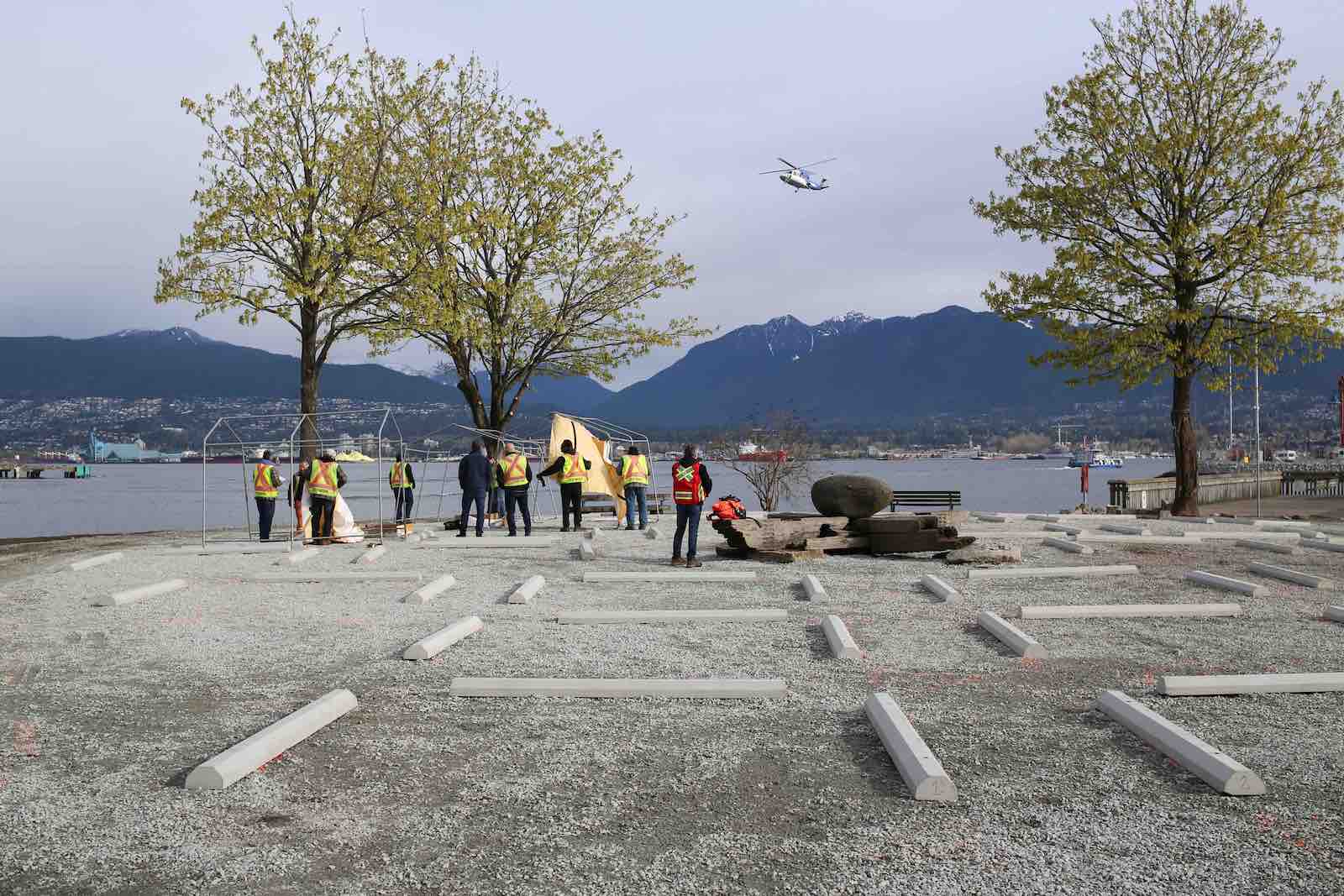
A man who asked to remain anonymous because being identified as homeless could impact his employment told The Tyee he doesn’t plan to go back because park rangers told him he wouldn’t be allowed to use his wooden bed frame and foam mattress. City staff told him they were fire hazards, he said.
“I don’t want to go into the SROs [single-room occupancy hotels] or anything like that,” said the resident, who said he’d spent five winters in CRAB Park in a shelter he’d made. The resident said he now planned to move from park to park, packing up his tent and belongings every morning in accordance with city bylaws.
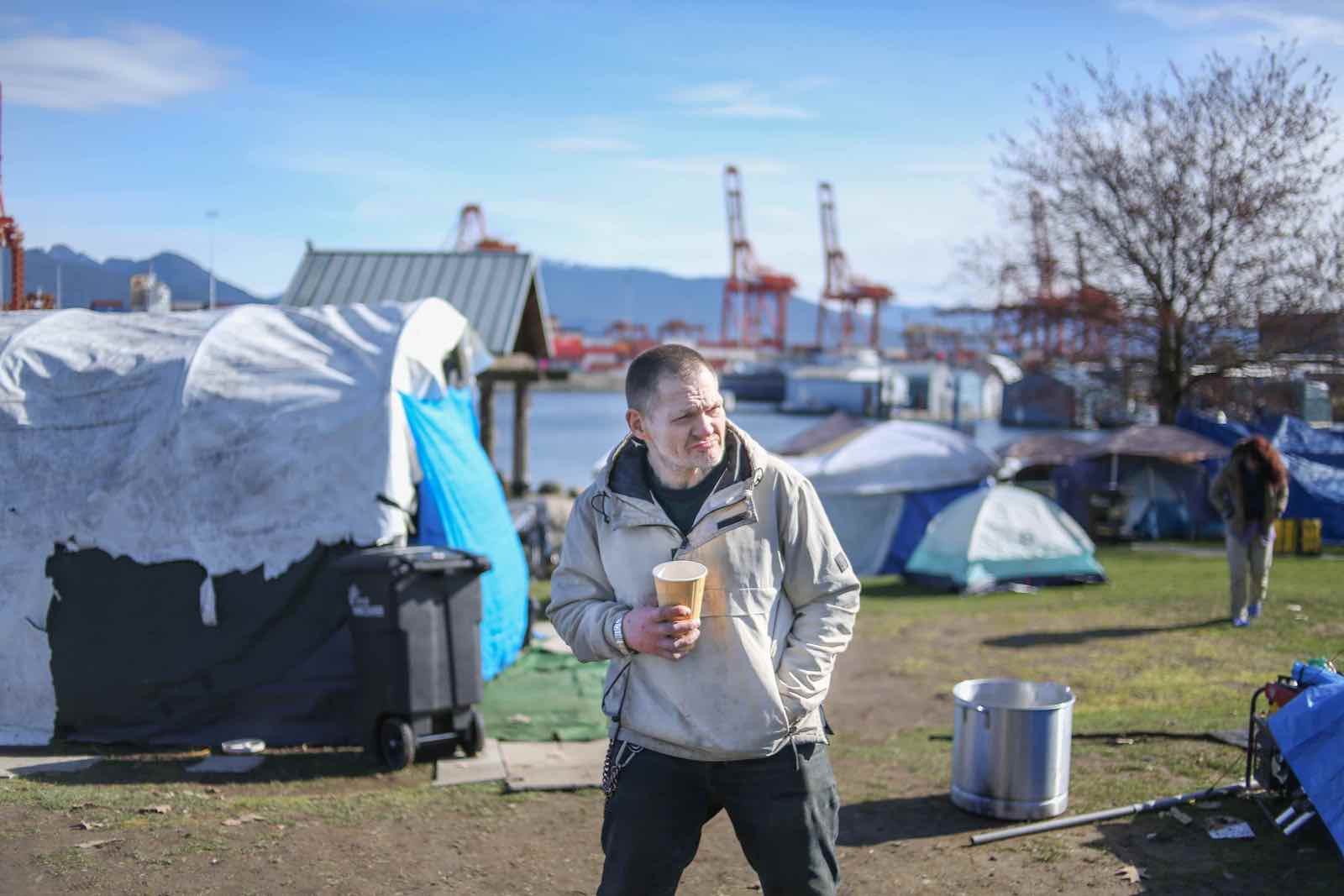

A woman who asked to be identified as T. said she’s been asking for a hand-washing station to be added to the encampment for the past few years and wasn’t sure if there was any point in moving back without that basic service.
“It’ll be a biohazard zone in three days without a hand-washing station,” she told The Tyee.
“It’s a health and safety matter. Any workplace, any kitchen, any environment you go to you must be able to wash your hands.”
In response to a question from The Tyee, park board staff said a hand-sanitizing station will be installed near the food tent soon.
Both T. and the man who asked to be kept anonymous said they believed the city was embarrassed by the tent city because it is in full view of the cruise ships that dock at Canada Place.
The city has also kept a tight watch on who is allowed to move back into the encampment, located on a small peninsula of the park on Burrard Inlet.
Staff have a list of 27 people who were living regularly at the park in February, staying there at least three nights a week.
Ashley Silver told The Tyee she planned to move back to the encampment and hoped residents would “be respectful” of each other’s space. She said one friend had “a nice little A-frame house” and it was sad to see structures being torn down.
“Everyone deserves a house,” she said. “Even though there’s lots of housing in Vancouver, it’s just impossible to get. If you say you’re on [disability benefits], you’re done.”
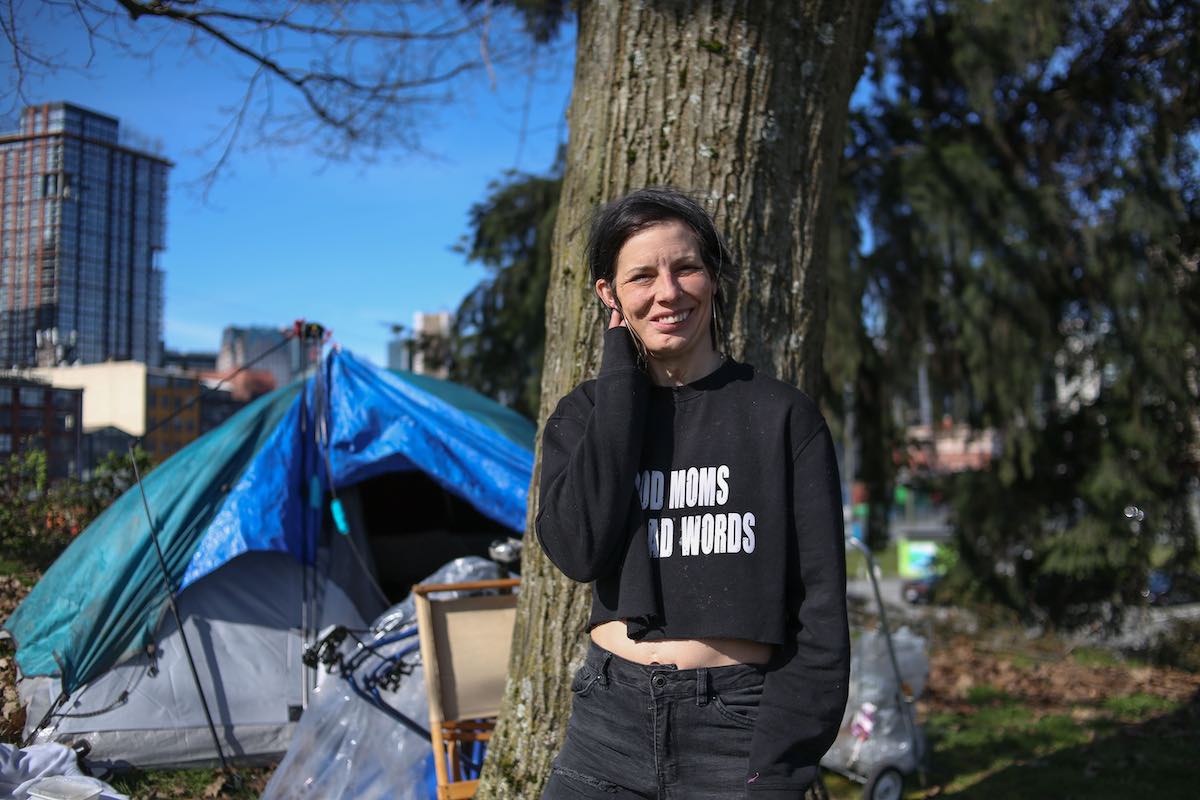
Fiona York, who has supported the tent city since it first took shape at CRAB Park in 2021, said only around a dozen residents have moved back since the cleanup and parks staff have removed a number of “unclaimed” new tents.
“The number is vastly reduced — we think there are 10 to 12 tents allowed in the peninsula now,” she told The Tyee. This winter, around 30 people were living in the tent city, according to York.
Advocates say that residents are now worse off after moving back to the site because they haven’t been allowed to place their tents on raised platforms and water had gotten inside tents in the heavy rain.
But park board staff say the previous tent city was full of rats, feces and needles, and structures were at risk of collapse.
Eight years of tent cities
Since 2016 there has been a large tent city somewhere in Vancouver, at first moving from empty lot to empty lot and then to city parks. All were in or near the Downtown Eastside neighbourhood.
From 2018 to 2020, a tent city housing hundreds of people was located at Oppenheimer Park. When that encampment was shut down in 2020 based on a provincial public safety order, the tent city briefly moved to a lot next to CRAB Park. But that encampment was swiftly evicted by the Port of Vancouver, which owns the land and got a court injunction to remove the settlement.
The encampment then moved to Strathcona Park, where it lasted from June 2020 until April 2021. After Strathcona Park was closed to camping, people started pitching tents in CRAB Park.
While some residents said the Oppenheimer and Strathcona tent cities provided a strong community and were safer than people being homeless alone, there were also violent crimes against camp residents, including a homicide and a horrific sexual assault.
Some neighbourhood residents also complained that the large encampments prevented them from using the parks.
But unlike at the tent cities at Oppenheimer and Strathcona parks, there have been few violent incidents reported at CRAB Park. A group of volunteers, including York, have been supporting the camp for years, saying it’s necessary to provide a community and safety in numbers for unhoused people.
In July 2021, the general manager of the park board tried to enact an order to end camping at CRAB Park.
But that order was overturned by a January 2022 B.C. Supreme Court ruling that found the housing being offered to residents — mostly shelter spots and rooms in single-room occupancy hotels — was not adequate for their needs.
Residents of tent cities in Vancouver often say they prefer to live outside than in single-room occupancy hotels, century-old buildings with shared washrooms that have become the housing of last resort for people living in poverty.
Current CRAB Park resident Sasha Christiano said he had been living at the Patricia Hotel — a housing option previously offered to residents of the Strathcona Park encampment — but left because it was isolating and “not the best environment for people who are trying to get things together.”
“People think of themselves as gangsters or something,” he said of some of the other residents at the Patricia.
Christiano’s experience is common. Randan left his SRO room at the Flint Hotel to live at CRAB Park because his partner did not feel safe at the Flint.
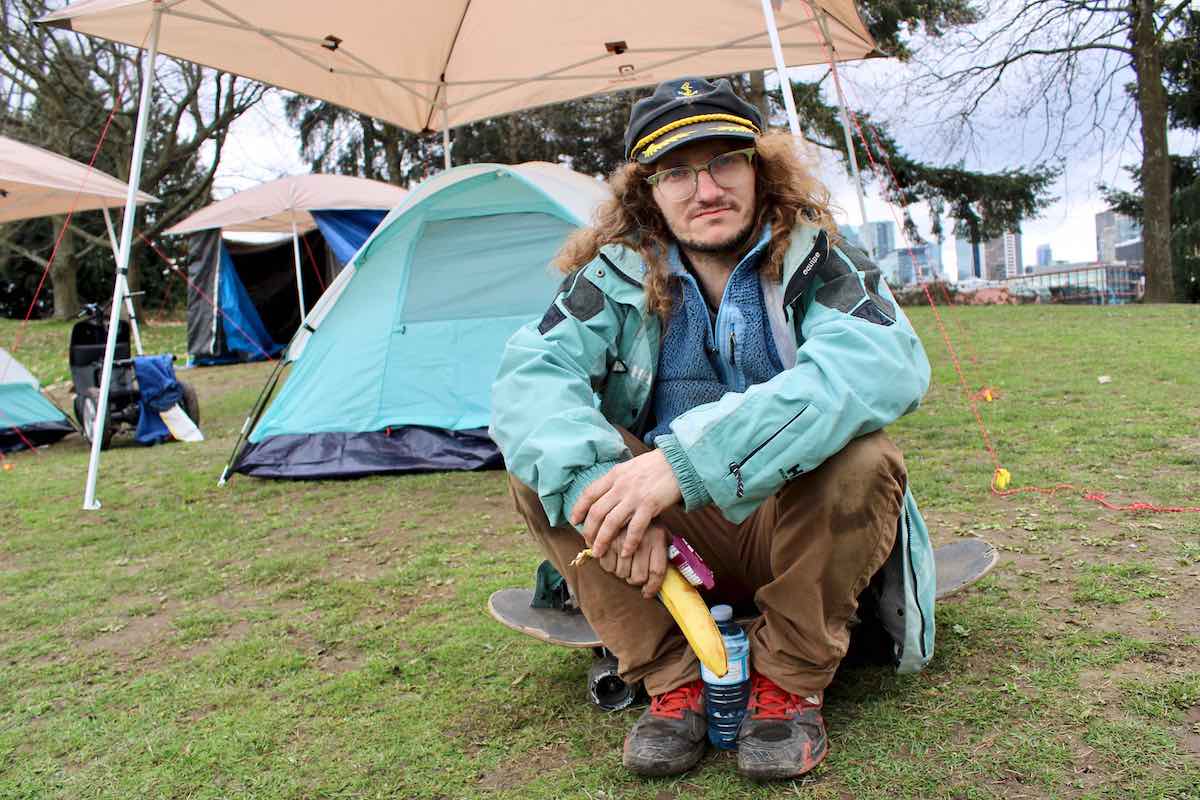
The court ruling made the CRAB Park encampment the only legally sanctioned tent city in Canada. But that wasn’t the end of conflicts between the park board and tent city residents and supporters. For months, park rangers have enforced limits on where people can set up tents, leading to conflicts between homeless people, police, rangers and tent city supporters.
On April 5, 2023, city staff and Vancouver police mounted an unusually aggressive removal of a tent city by seizing tents and belongings from East Hastings Street. That operation, which cost the city over $500,000, was heavily criticized for evicting people without offering adequate housing, for keeping homeless service organizations in the dark and for blocking media access to witness the decampment.
On March 12, city staff announced a “cleanup” operation would take place in CRAB Park to remove many of the structures residents had built around their tents over the years.
“This is not a decampment,” Sandra Singh, a deputy city manager whose file includes homelessness, told media during a briefing on March 12.
“This is an attempt to clean up this area and ensure that the area is bylaw compliant for safety and health reasons.”
Singh also assured media they would have access to witness the operation. But on March 25, the deadline for CRAB Park residents to temporarily move out, reporters and camp supporters were not allowed past the fencing set up around the perimeter.
When The Tyee visited the park in the days leading up to March 25, we witnessed park rangers cutting open a shelter, then leaving. Park board staff told The Tyee that the rangers were seeing if the shack was occupied and decided to cut open the structure because the entrances were nailed shut.
“We recognize that this decision resulted in dismay and unnecessary tension. In discussion with the team, it was shared that a better approach would have been to have staff locate someone in the encampment who could have opened the structure so it could be inspected,” Godfrey Tait, a park board communications staffer, told The Tyee. “That is the expectation of what will and should happen moving forward.”
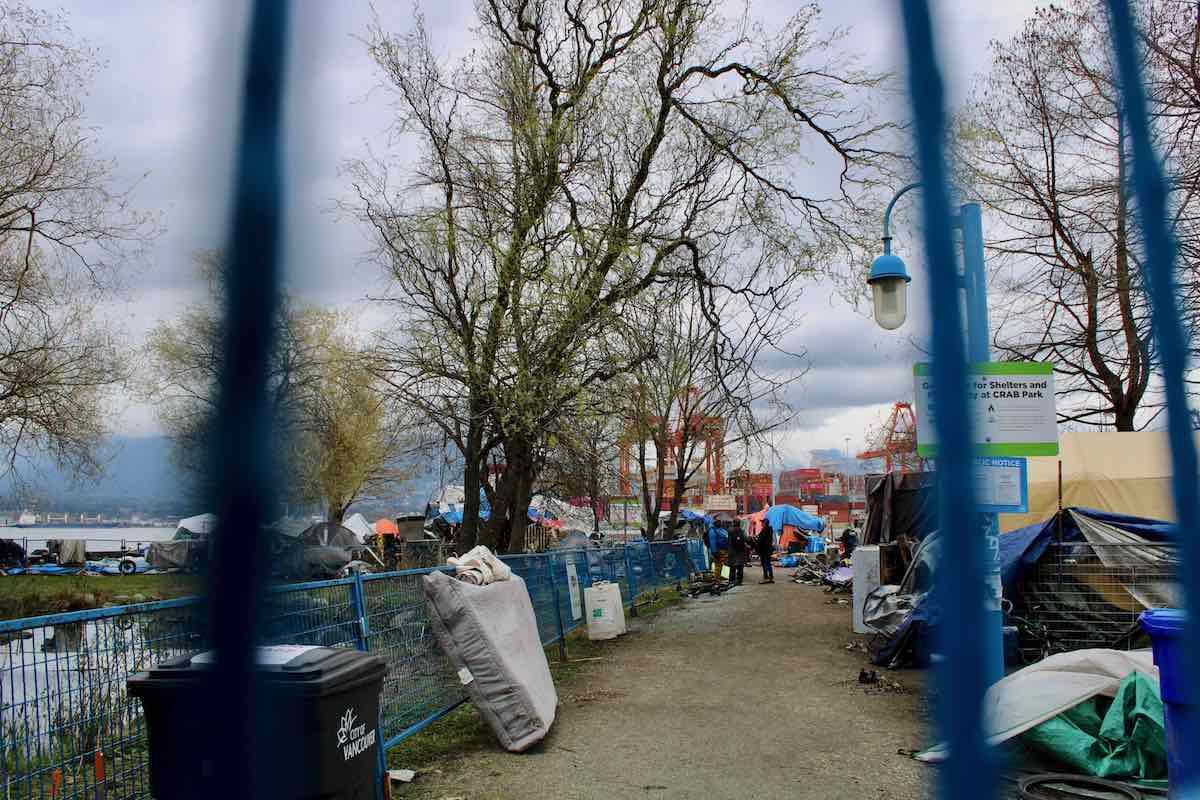
On April 4, Singh told The Tyee the cleanup effort was the first step in closing the CRAB Park camp for good. She said remaining residents will be offered housing over the next few months with the hope the encampment will be gone by winter.
Singh said the designated camp area won’t be allowed to grow larger than 27 tents, although people can continue to set up tents elsewhere in the park as long as they remove them in the morning.
On Monday, park board commissioners voted to adopt more stringent regulations for sheltering in parks.
Under the tighter rules, homeless people won’t be able to bring lumber and other construction materials into parks, will have to live in their shelters on a regular basis and will be limited to a 100-square-foot space for their shelter.
Advocates for people living at CRAB Park told park board commissioners the new rules would make things much harder for unhoused people and said park residents hadn’t been adequately consulted. Several lawyers warned the park board that the new regulations might not withstand a court challenge.
In January, park rangers prevented CRAB Park advocates from building tiny homes to shelter people. Most residents The Tyee spoke to said they had built structures around their tents to make them warmer and more secure.
Singh said the structures that had been built — and especially the two-storey shack — were not safe. Although residents aren’t supposed to use propane for heating and cooking, they do, increasing the risk of fire.
She said tiny homes would also not be allowed. “That would not be compliant,” she said. “It could be a canopy, it could be a stand-alone camping tent. It has to be pack-up-able in case we have to do maintenance.”
York said the city should have increased access to electricity for tent city residents to reduce the risk of fire and provided basic necessities, like hot water and charging for phones.
But in a statement, park board staff told The Tyee that right now there is no electricity in the park — except to operate a 911 call box — because two transformer boxes and the park’s lights have been repeatedly vandalized.
Staff also told The Tyee that an electrical outlet near the camp has been repeatedly overloaded because too many devices have been plugged into it.
At the park board meeting Monday, Steve Jackson, park board general manager, told commissioners that staff are still looking at options for electricity and that solar power could provide a solution. And CRAB Park supporters said that residents were only tampering with the electrical systems in an attempt to access more power to be able to survive.
After moving back to the peninsula after the park board’s cleanup operation, T. said that without a barrier between her tent and the ground, it was very cold. (Before, many residents had placed their tents on wooden pallets to keep them off the ground.) She was also concerned about the risk of fire.
“The new tent sites provided come with a pool of water between your ground sheet and your tent. Wet plus cold equals hypothermia,” she said in a statement shared by several tent city supporters.
“Or maybe one tent fire to take out all the tents all together since they are barely three feet apart.” ![]()
Read more: Rights + Justice, Housing




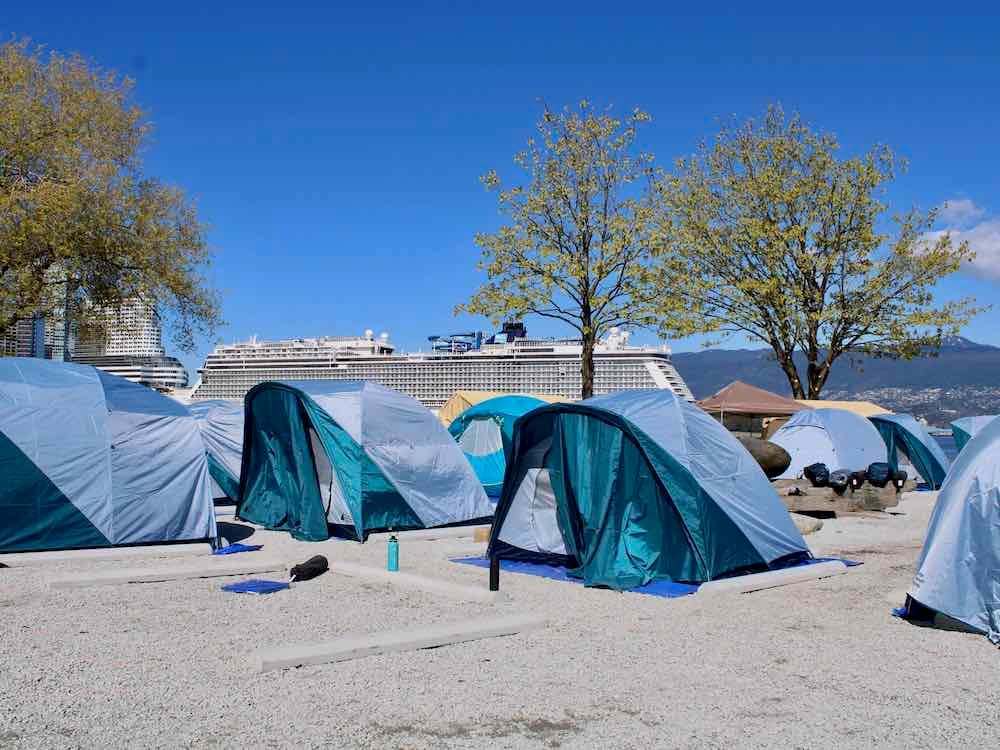












Tyee Commenting Guidelines
Comments that violate guidelines risk being deleted, and violations may result in a temporary or permanent user ban. Maintain the spirit of good conversation to stay in the discussion and be patient with moderators. Comments are reviewed regularly but not in real time.
Do:
Do not: